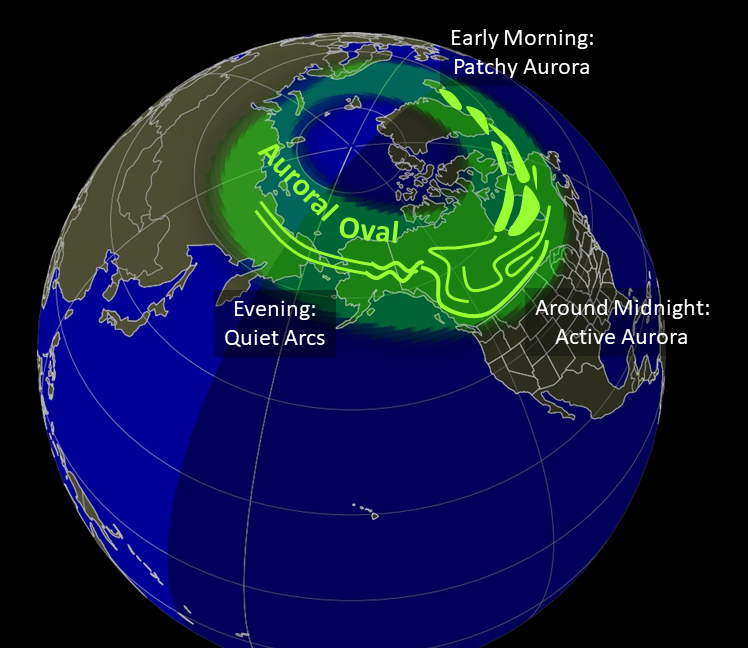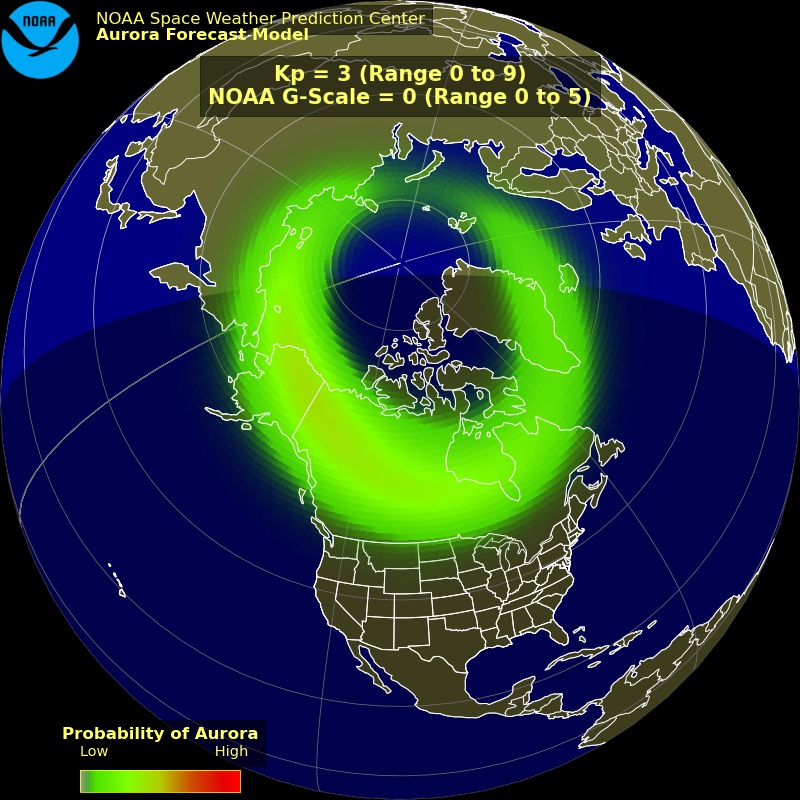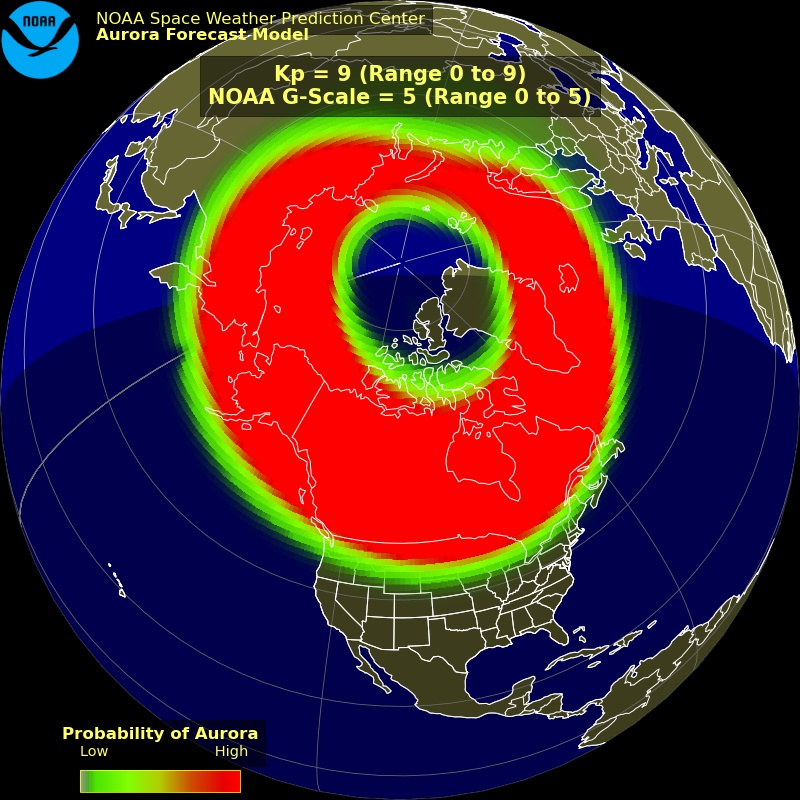NOAA aurora prediction is a fascinating field that combines cutting-edge science with the beauty of nature. The National Oceanic and Atmospheric Administration (NOAA) plays a pivotal role in forecasting these celestial events, offering enthusiasts and researchers alike a glimpse into the dynamic interactions between solar winds and Earth's magnetic field. Understanding how NOAA's predictions work can deepen our appreciation for the auroras and provide valuable information for planning observations. Whether you're an amateur stargazer or a seasoned scientist, delving into NOAA's aurora prediction methods opens up a world of wonder and discovery.
As the auroras dance across the night sky, their mesmerizing patterns captivate observers around the globe. But what drives these breathtaking displays? NOAA's aurora prediction systems harness advanced technology to monitor solar activity and translate it into forecasts that are both accurate and accessible. By leveraging satellite data and sophisticated models, NOAA can predict when and where auroras are likely to occur, giving people the opportunity to witness this natural phenomenon firsthand.
The significance of NOAA aurora prediction extends beyond mere observation. For scientists, these predictions serve as crucial tools for studying the Earth's magnetosphere and understanding the impacts of space weather on our planet. For the general public, they offer a chance to connect with nature and marvel at the universe's wonders. This article delves into the intricacies of NOAA's aurora prediction processes, highlighting their importance and providing tips for maximizing your aurora-viewing experience.
Read also:Rays Home Games Your Ultimate Guide To Catching The Excitement
What Exactly is NOAA Aurora Prediction?
NOAA aurora prediction refers to the practice of forecasting auroral activity using data collected by NOAA's Space Weather Prediction Center (SWPC). This involves monitoring solar flares, coronal mass ejections (CMEs), and other solar phenomena that influence Earth's magnetic field. By analyzing these factors, NOAA can estimate the likelihood of auroras occurring at specific locations and times.
Why is NOAA Aurora Prediction Important?
Understanding the importance of NOAA aurora prediction requires recognizing its dual role in scientific research and public engagement. On one hand, it aids scientists in studying the complex interactions between the Sun and Earth. On the other hand, it empowers individuals to plan their aurora-viewing trips effectively. With accurate predictions, enthusiasts can optimize their chances of witnessing the Northern Lights in all their glory.
How Does NOAA Aurora Prediction Work?
The mechanics behind NOAA aurora prediction involve a combination of satellite observations, ground-based measurements, and computational models. Satellites like the Deep Space Climate Observatory (DSCOVR) and the Advanced Composition Explorer (ACE) provide real-time data on solar wind conditions. Ground stations measure geomagnetic activity, while computer algorithms process this information to generate forecasts. Together, these components create a comprehensive system for predicting auroral displays.
How Accurate are NOAA Aurora Predictions?
While NOAA aurora predictions are highly reliable, they are not infallible. Factors such as sudden changes in solar wind behavior or local atmospheric conditions can affect the accuracy of forecasts. However, advancements in technology continue to improve prediction precision, making it easier for people to plan their aurora-viewing adventures with confidence.
What Role Does the NOAA Space Weather Prediction Center Play?
The NOAA Space Weather Prediction Center (SWPC) is the primary entity responsible for NOAA aurora prediction. Established to monitor and forecast space weather, the SWPC employs a team of experts who analyze data from various sources to produce accurate and timely forecasts. Their work not only benefits aurora enthusiasts but also supports critical infrastructure sectors such as aviation, navigation, and telecommunications.
Can Anyone Access NOAA Aurora Prediction Data?
Yes, NOAA aurora prediction data is freely available to the public through the NOAA SWPC website. Visitors can access real-time updates, forecast maps, and detailed reports to stay informed about upcoming auroral activity. This accessibility democratizes the experience of observing auroras, allowing people from all walks of life to participate in this awe-inspiring phenomenon.
Read also:Danville Va Hobby Lobby Your Ultimate Guide To Crafting And Creating
What Factors Influence NOAA Aurora Prediction?
Several key factors influence NOAA aurora prediction, including solar wind speed, density, and magnetic field orientation. When these elements align in a specific way, they create conditions conducive to auroral activity. Additionally, geographic location and local weather conditions play a role in determining whether an aurora will be visible from a particular area.
What Should You Know Before Checking NOAA Aurora Prediction?
- Understand the basics of auroral formation and how it relates to solar activity.
- Familiarize yourself with the terms used in NOAA aurora prediction reports, such as Kp index and geomagnetic storms.
- Consider the best viewing locations and times for optimal aurora visibility.
What Tools Can Help Improve NOAA Aurora Prediction Accuracy?
Various tools and resources can enhance the accuracy of NOAA aurora prediction. These include specialized software for analyzing solar data, high-resolution satellite imagery, and collaborative platforms for sharing observations among the scientific community. By integrating these tools into their workflow, NOAA scientists can refine their models and produce more precise forecasts.
What Are the Best Practices for Using NOAA Aurora Prediction?
To make the most of NOAA aurora prediction, follow these best practices:
- Regularly check the NOAA SWPC website for the latest updates and alerts.
- Sign up for email notifications to receive instant alerts about significant auroral activity.
- Combine NOAA predictions with local weather forecasts to ensure clear viewing conditions.
- Plan your trip to a remote location away from light pollution for the best possible experience.
What Challenges Exist in NOAA Aurora Prediction?
Despite its advancements, NOAA aurora prediction faces several challenges. The unpredictable nature of solar activity means that forecasts can sometimes be inaccurate. Additionally, limitations in current technology and data availability can hinder the development of more sophisticated prediction models. Overcoming these obstacles requires ongoing research and innovation in the field of space weather science.
How Can You Contribute to NOAA Aurora Prediction?
Enthusiasts and citizen scientists can contribute to NOAA aurora prediction by sharing their observations and data with the scientific community. By participating in crowdsourced projects and using dedicated apps to report auroral sightings, individuals can help improve the accuracy of forecasts and expand our understanding of this captivating natural phenomenon.
Conclusion: Embracing the Wonders of NOAA Aurora Prediction
NOAA aurora prediction represents a remarkable intersection of science and nature, offering us a window into the universe's mysteries. By staying informed about the latest developments in this field and utilizing the resources provided by NOAA, we can enhance our appreciation for the auroras and deepen our connection to the cosmos. Whether you're a seasoned researcher or a curious beginner, the journey into NOAA aurora prediction promises to be both enlightening and inspiring.
Table of Contents
- What Exactly is NOAA Aurora Prediction?
- Why is NOAA Aurora Prediction Important?
- How Does NOAA Aurora Prediction Work?
- How Accurate are NOAA Aurora Predictions?
- What Role Does the NOAA Space Weather Prediction Center Play?
- Can Anyone Access NOAA Aurora Prediction Data?
- What Factors Influence NOAA Aurora Prediction?
- What Should You Know Before Checking NOAA Aurora Prediction?
- What Tools Can Help Improve NOAA Aurora Prediction Accuracy?
- What Are the Best Practices for Using NOAA Aurora Prediction?


